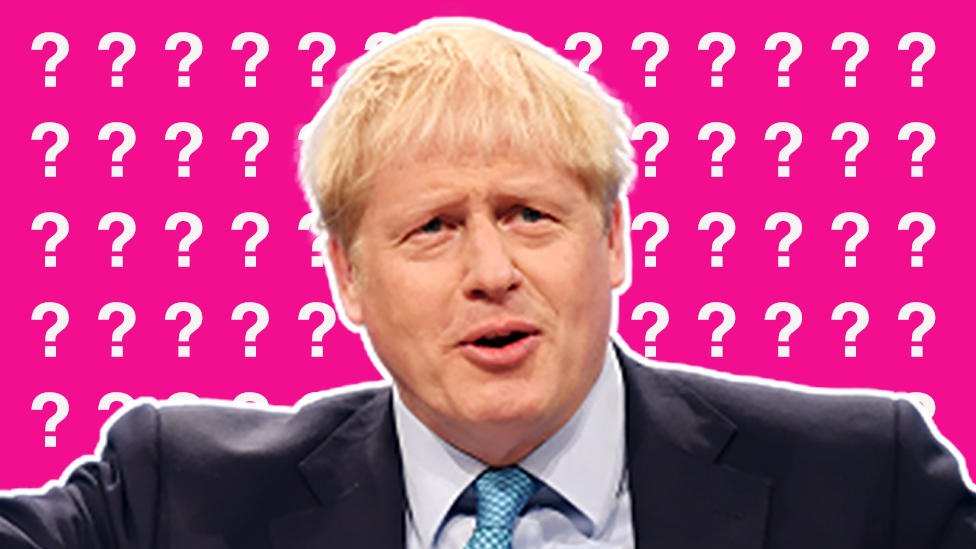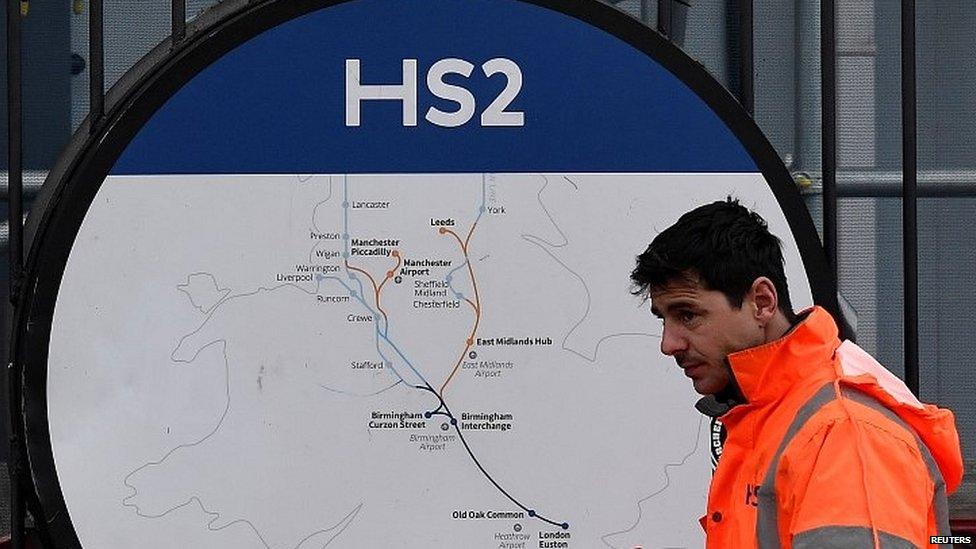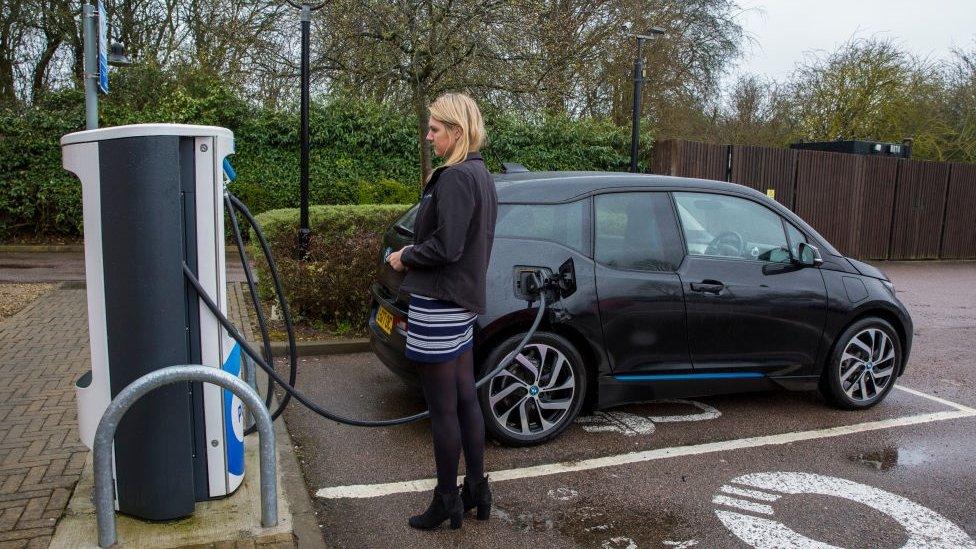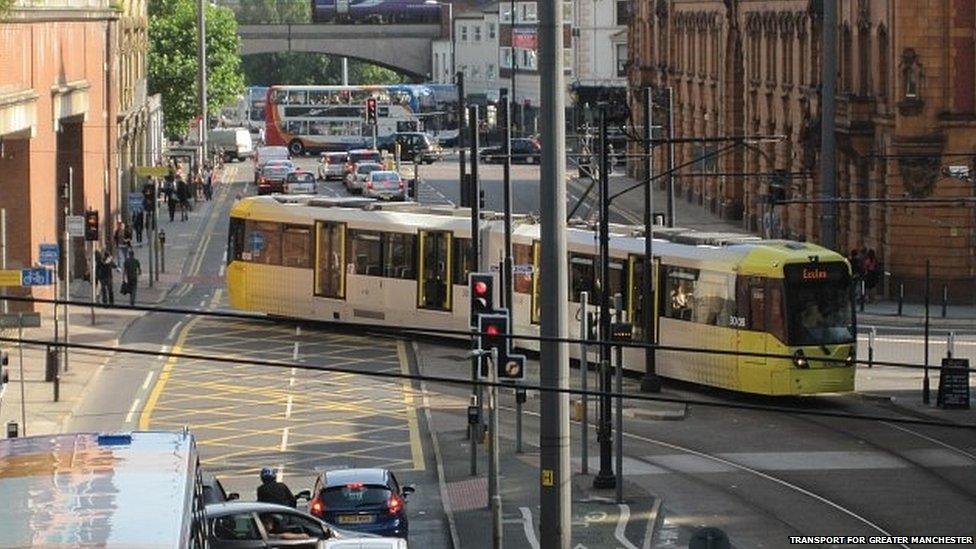Boris Johnson: Five crucial policy decisions facing the PM
- Published
- comments

For the past few years, volatility in British politics has seemed the new normal.
But barring unforeseen events, it looks likely Boris Johnson will be in residence in Downing Street until 2024, at least.
The Conservatives' resounding election victory has given him real political authority, but the challenges facing him are also considerable.
What are the key decisions that could come to define the Johnson years?
HS2: Will it go ahead or be stopped it in its tracks?

The fate of the UK's largest infrastructure project is hanging in the balance.
Boris Johnson must soon decide whether HS2 will go full steam ahead, be scaled back or cancelled entirely. His choice - as well as the government's broader prescription for the UK's faltering rail network - will say a lot about his vision for post-Brexit Britain.
The idea of a high-speed rail link connecting London, the West Midlands and the North of England is a long-held dream for its supporters. For its detractors, the gargantuan project - currently estimated to cost between £81bn and £88bn - has become the stuff of nightmares.
The PM has a political tightrope to walk, as well as a business decision to make.
Can he satisfy Tory activists in the eye of the route who are vociferously opposed, as well as his new cohort of MPs in the Midlands, Yorkshire and Greater Manchester who desperately want better local services and more investment?
The PM has sent varying signals so far, insisting costs cannot continue to spiral while also hinting that, temperamentally, he is in favour of a scheme that could help rebalance the UK's lopsided economy and address regional disparities.
There are two reports sitting on his desk - a review of the project by Doug Oakervee, likely to recommend it goes ahead pretty much as planned, and a dissenting view from his deputy, Lord Berkeley, which warns of mounting costs and delays unless it is completely redesigned.
If it does proceed, HS2 trains could potentially be running on the first section of the line by 2029. This, if he was still in power, would be the tenth anniversary of Mr Johnson becoming PM.
The union: Will there be another Scottish independence referendum?

Boris Johnson and Nicola Sturgeon are on a collision course.
The SNP leader has her heart set on another Scottish independence referendum and the prime minister is determined to thwart her, or at least, postpone the day of reckoning for as long as possible.
The prime minister has rejected a request from Scotland's first minister for the necessary powers, known as a Section 30 order, to hold another vote on the union.
He says all sides agreed before the 2014 referendum, which resulted in a clear No vote, that it was a "once in a generation" event. The decision taken by the Scottish people then must be upheld, he insists.
End of story? Well, not quite. Independence is the SNP's central driving force and Ms Sturgeon believes she has the wind in her sails after her party did better than expected in the general election.
She has said she will consider her next steps but once the UK has left the EU on 31 January - a Brexit which Scotland did not vote for - she is likely to step up the pressure on Downing Street.
She has, so far, ruled out Scotland following the example of Catalonia and holding a referendum without Westminster's agreement. But other options, including some form of legal challenge or getting the Scottish Parliament to symbolically legislate itself for a referendum, remain open.
The ultimate showdown could well be delayed until May 2021, when Ms Sturgeon will hope to win a direct electoral mandate for another referendum by getting a majority in Holyrood elections.
If that transpired, could Mr Johnson continue to stand in her way? Or will he end up taking the same calculated gamble as David Cameron that a unionist victory might settle the issue for good?
Social care: Will there be a long-term fix or more delay?

Can Boris Johnson succeed where his two predecessors failed and find a lasting, affordable solution to funding care for the elderly?
Supporting the growing number of people living longer but with chronic conditions is a huge challenge, and one that, despite political good will and the work of endless experts, eluded both David Cameron and Theresa May.
The PM has a head start with a large Commons majority and the public finances healthier than at any time in the past decade.
But he knows that mere tinkering with the current means-tested system for helping people pay for basic tasks, such as getting washed and dressed, will not be acceptable.
He raised expectations when first becoming PM by suggesting he had a plan to fix the issue once and for all. He has offered to work with other parties on a way forward and much will depend on whether Labour's new leader - whoever they are - is willing to invest political capital in the process.
While promising a blueprint in 2020, Mr Johnson has said it could take four years to implement. He has given little away about his own thinking, beyond stressing the importance of maintaining dignity in old age and stopping people having to sell their own homes to pay for care.
Pressed during the election on what it would cost to meet such a guarantee, the PM - who has already committed to ploughing record sums into the NHS without raising personal taxes - struggled to come up with a figure.
There is wide support for a cap on individuals' lifetime contributions combined with more state funding, while on the left and right there are proponents of a free universal system and a savings-based model for those who can afford it.
Whatever his government decides, achieving the kind of political consensus that underpins the NHS will be hard.
Climate change: Can there be a green revolution without big tax rises?

Climate climate is one of the "grand challenges" of the next decade, according to the Conservatives, along with finding a cure for dementia and harnessing artificial intelligence.
During the election, the party resurrected the "vote blue, go green" slogan first used by David Cameron in 2010.
Mr Cameron's record in government did not always live up to the early "hug a huskie" hype and Boris Johnson - whose partner Carrie Symonds is a passionate conservationist - will be expected to be more ambitious.
The UK is committed to net zero greenhouses gas emissions by 2050. While there will inevitably be pressure to bring this date forward, the current focus is on how the target will be met and what the economic effects will be.
There's a commitment to create two million new jobs in the industries of the future while building on the UK's natural strengths in areas such as offshore wind power. But will the £500m earmarked to help energy-intensive industries transition to a low-carbon future be enough?
The PM will want the market to take the lead and for the state to be seen to facilitate, rather than dictate, consumer choices. Hence, the promise to consult on the "earliest date" for phasing out diesel and petrol cars rather than mandating a cut-off point.
March's Budget is expected to have a green tinge, with tax breaks for de-carbonisation schemes and facilities making electric vehicle batteries. But will the PM be content for the tax system to encourage innovation or bow to those who want it to be an instrument to change behaviour?
The government has promised "strict" new laws on air quality but can it deliver meaningful pollution targets without asking motorists - who have enjoyed a nine-year freeze in fuel duty - or air passengers to pay more?
And will the £4bn in extra cash promised to prevent flooding be remotely enough to shore up the UK's defences?
The Northern Powerhouse: Will the dream become a reality?

For the former Chancellor George Osborne, giving the North of England the tools and resources it needs to compete with the south was an economic imperative.
For Boris Johnson, it has arguably become a political necessity.
On 12 December, the Conservatives pulled off scores of victories in towns such as Burnley, Wakefield, Redcar, Sedgefield and Workington they could scarcely have dreamt of.
After annexing large sections of Labour's "red wall", Mr Johnson will have to deliver on Brexit, his main campaign promise, if his party is to retain its allegiance next time around.
But he also has the opportunity to consolidate his party's surprise gains by delivering on his pledge to "level up" opportunities across the UK and ensure the North is no longer the poor relation when it comes to spending on transport, industrial and digital infrastructure.
Existing projects, such as the extension of the Manchester tram network, could be accelerated while others in development, such as the first phase of the Northern Powerhouse Rail line between Leeds and Manchester and the dualling of the A66, will be given greater impetus.
There is talk of a Department for the North, while there are plans afoot to overhaul the way the Treasury calculates value for money in public spending, to address the historic bias towards faster-growing parts of the country.
Mr Johnson, the former MP for leafy Henley who ran London for eight years, seems an unlikely standard bearer for the North. But with his chief adviser Dominic Cummings set on refashioning how Whitehall works, the rules of the game may be about to change.